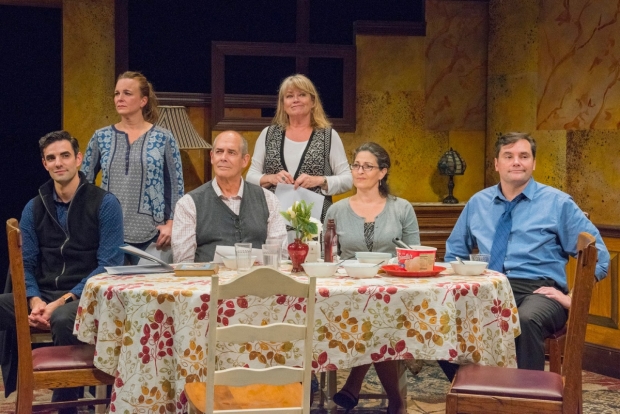
(© Andrew Brilliant)
Sometimes the moments with the greatest resonance are those that seem nothing but ordinary. Such is the case with Richard Nelson's Regular Singing, which is making its Boston-area debut at the New Repertory Theatre, in a coproduction with Stoneham Theatre.
Regular Singing is the fourth and final play that Nelson has written about the Apple Family of Rhinebeck, New York. (The plays were all commissioned by the Public Theater, where they debuted between 2010 and 2013.) All of the Apple Family plays are set on a day of great significance: That Hopey Changey Thing on the day of the 2010 midterm elections; Sweet and Sad on the 10th anniversary of September 11; Sorry on Election Day 2012; and Regular Singing on the 50th anniversary of the JFK assassination. In doing this, Nelson bridges the gap between ordinary and extraordinary and seeks to illustrate the ways in which a typical American family struggles to make sense of these times and of one another. Regular Singing stands the best on its own, independently of the other plays.
Director Weylin Symes, who has previously directed the other Apple Family plays in the Boston area, is back at the helm. So, too, is the same great cast of six who have grown into their own kind of family. The effortless chemistry of the cast is a wonder to behold, and it perfectly suits Nelson's natural-sounding dialogue. Regular Singing unfolds in real time, adding even more to the feeling that the audience is eavesdropping in on this family.
The Apple siblings — Richard (Bill Mootos), Marian (Sarah Newhouse), and Jane (Laura Latreille) — as well as Jane's husband, Tim (Paul Melendy), have all gathered at the house of their sister Barbara (Karen MacDonald). Their uncle, Benjamin (Joel Colodner), a retired actor with a fading memory who now lives in an assisted living facility, is also there.
When Marian's ex-husband, Adam (whom we never see), was diagnosed with cancer, he vowed to stay alive until at least November 22, the anniversary of the JFK assassination (the day the play takes place). The reason, Marian says, is that Adam felt that moment was one of the only times that the country felt truly united. Barbara, nurturer that she is, has allowed Adam and Marian to stay in her house as he nears the end. As the family waits and prepares in Barbara's well-worn dining room (designed by Crystal Tiala, who uses the same set and props as in the other four productions), Adam lies upstairs inching toward the end with his mother at his side. He's not expected to survive the night.
Adam has left detailed instructions for his memorial service, and in between banal family chatter, a couple of heated arguments, and talk of careers, exes, children, and politics, they rehearse the occasional hymn. As the night crawls on, they curse themselves each time they refer to Adam in the past tense.
For all of Nelson's remarkable accomplishments with Regular Singing, the play stays a little past its welcome. Running two intermission-less hours, some of the family's meandering and pointless stories begin to test the patience of the audience.
But the air-tight ensemble cast deserve all the praise in the world for their performances here. Not one of them ever seems like they are acting, and this speaks not only to their talent but also to the pristine direction of Weylin Symes.
If Regular Singing occasionally seems aimless and tedious, the full power of Nelson's work grows and becomes more apparent after the lights have come up. Don't be surprised if you find that the Apple Family sticks with you. Though light on plot, Regular Singing is an acutely observed examination of the American family and the ways in which major events – both national and personal – inform the ways we interact with one another.











